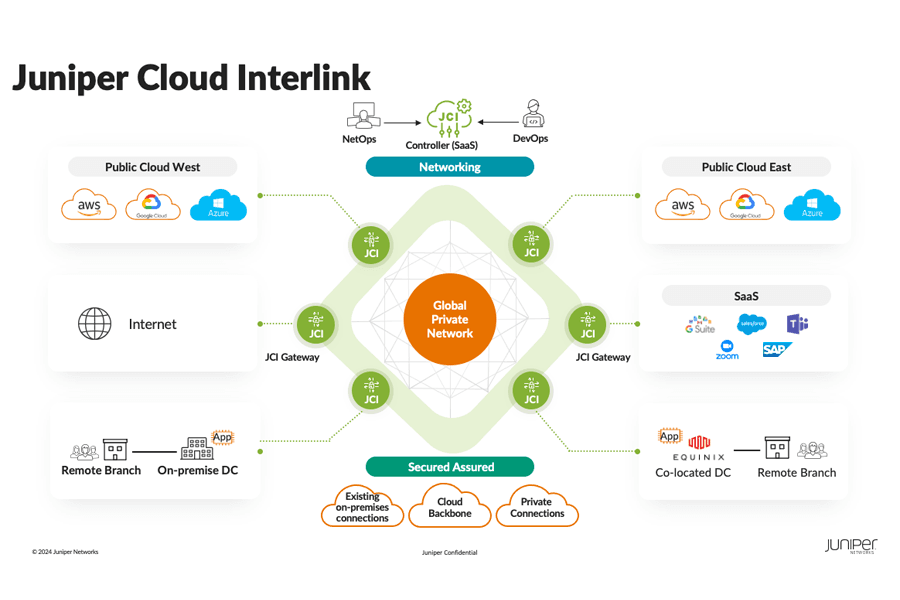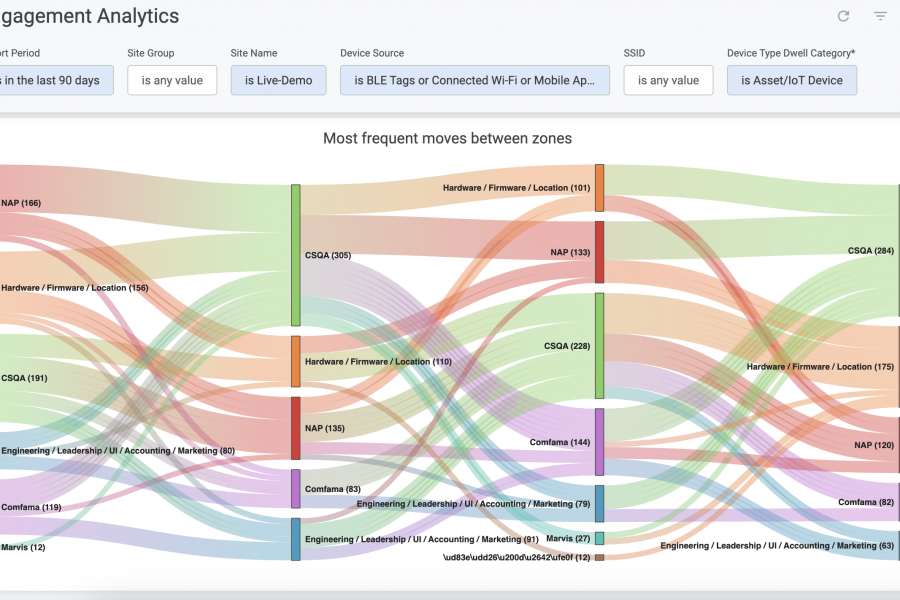Accelerating Digital Transformation with Committed Spend and Private Offers
As businesses accelerate their digital transformation journeys, the need for efficient procurement makes cloud marketplaces an attractive option. At the same time, as customer requirements grow in complexity and scale, purchases combining Software-as-a-Service (SaaS) solutions and SaaS appliances (traditionally referred to as hardware) have become commonplace.
Cloud marketplaces, traditionally home to software-only solutions, must address this growing requirement to simplify the purchase of complex bills of materials (BOMs) that combine software and the premises appliances needed to drive the SaaS solution.
This blog explores how Juniper Networks offers customers a simple and cost-effective option to bundle software and SaaS appliances into a single, complex (i.e. containing multiple elements) bill of materials and purchase it via the cloud marketplace. Central to this capability is the vital role of Juniper’s partner network. In this blog, we will explain the fundamentals of the purchase process in the cloud marketplaces and highlight Juniper’s AI-Native Networking Platform as an example of how these purchases work for the end customer and channel partner.
The Fundamentals of Purchases in Cloud Marketplaces
Private Offers
A Cloud Marketplace Private Offer is a mechanism cloud service providers offer to enable negotiations and custom pricing arrangements between solution providers and customers or partners for purchases made through cloud marketplaces. This option is often available on major cloud platforms like Amazon Web Services (AWS), Microsoft Azure, and Google Cloud Platform (GCP). Private offers provide flexibility for the customer, solution provider (lists the product on the marketplace), and channel partner. It allows for custom pricing structures and specific terms and conditions that may not be available through the standard public pricing model. Below is how the Private Offer process generally works:
Negotiation & Agreement
A customer or partner interested in a cloud service contacts the cloud provider or ISV (Independent Software Provider) for a custom arrangement, which might involve factors such as pricing and terms and conditions.
Private Offer Creation
The ISV and their partner deliver a Private Offer based on the agreed-upon terms for the specific customer. This offer is not visible to the public and is specific to the negotiating parties.
Delivery & Activation
The Private Offer is delivered to the customer or partner, who can review and accept the terms. Once accepted, the negotiated services are activated for use.
Billing & Management
The billing for the services is typically handled according to the terms of the Private Offer. The customer or partner can manage and monitor their usage through the standard cloud provider’s tools and interfaces.
Using Private Offers for complex bills of materials (BOMs) in cloud marketplaces allows customers to use committed spend for purchases not only comprised of software solutions.
Committed Spend
Committed cloud spend typically refers to a pricing model offered by public cloud providers where customers commit to a certain usage level or spend with the provider in exchange for discounts or other benefits. This model is also known as a “commitment-based” or “reserved capacity” model. Below is a table breakdown of the key concepts.

Value of the Committed Spend Model
This model is beneficial for businesses with predictable workloads and usage patterns. By committing to a certain level of spending, they can realize cost savings compared to on-demand pricing. However, this model may not be suitable for organizations with highly variable workloads that cannot accurately predict their usage in advance.
It’s important to note that each cloud provider may have variations of commitment-based pricing models, and the specific terms and conditions can vary. Examples of services where commitment-based models are commonly applied include virtual machines, storage, and other compute resources.
This mechanism is especially beneficial for larger enterprises or partners that have negotiated pricing based on their usage patterns or have unique needs that require service level agreements (SLAs). It provides a way to tailor cloud services to the specific needs of a particular customer or partner while still leveraging the underlying infrastructure and services provided by the cloud platform.
Remember that the specific details and features of Private Offers can vary between different cloud providers, so it’s advisable to refer to the documentation of the respective cloud platform for the most accurate and up-to-date information.
Understanding Complex Bills of Materials (BOM)
Now that you understand Private Offers and committed cloud spend, we will explain how customers can pull those two levers to make a large purchase through a cloud marketplace consisting of software and SaaS appliances, typically called complex bills of materials (BOM).
A complex BOM comprises various components, including SaaS subscriptions and appliances, bundled to create a unified solution that meets specific business needs. These BOMs can vary significantly, from cloud-based software applications paired with networking equipment to IoT devices coupled with cloud storage and analytics platforms.
How Customers Use Private Offers for a Complex BOM
Below is a step-by-step guide on how customers can use Private Offers in a complex BOM scenario.
Understand Your BOM
Clearly define your complex BOM, listing all the components and services required for your project or application. This list may include various cloud resources such as compute instances, storage, databases, networking components, and additional services.
Identify Potential Savings
Analyze your BOM to identify potential areas for cost optimization. Understand each component’s usage patterns and requirements to determine where committed usage might result in cost savings.
Engage with a Partner or the Software Provider
Reach out to the software provider that has listed the product you wish to purchase or an authorized channel partner. Initiate discussions about your specific needs, emphasizing the complexity of your BOM and the desire for a Private Offer.
Negotiate Pricing & Terms
Work with the software company and partner to negotiate pricing and terms based on your BOM. Discuss volume commitments, contract duration, and additional services or support required.
Customize the Offer
Take advantage of the customization options provided by Private Offers. Tailor the offer to match the unique requirements of your BOM; this might include specific configurations, performance guarantees, or other features.
Review Support and SLAs
Ensure that the Private Offer includes the level of support and service-level agreements (SLAs) that align with the criticality of your application; this is especially important for complex BOMs where reliability and performance are paramount.
Finalize the Agreement
Review the negotiated terms and conditions. Once both parties are satisfied, finalize the Private Offer agreement; this may involve signing a contract or accepting the terms directly within the cloud marketplace interface.
Implement the Solution
Once the Private Offer is accepted, implement the solution according to the agreed-upon terms. Deploy the resources and services outlined in the BOM within the cloud environment.
Role of Channel Partners in Complex BOMs
Channel partners play a vital role in procuring and deploying complex BOMs. Below is a table of how channel partners fit into the equation:

Juniper’s AI-Native Networking Platform Purchased as a Complex BOM
Juniper’s AI-Native Networking Platform is an excellent example of complex BOMs that require SaaS appliances paired with cloud-based management. Juniper’s channel partners can guide customers in integrating Juniper Mist solutions into their existing infrastructure, creating a seamless and scalable networking environment. View Juniper’s Solutions on AWS Marketplace.
Cloud marketplaces have revolutionized how businesses purchase complex bills of materials, including SaaS solutions and appliances. Leveraging the expertise of channel partners and considering solutions like Juniper’s can enhance the efficiency and effectiveness of such purchases. As organizations continue to embrace digital transformation, the streamlined procurement process provided by cloud marketplaces becomes a critical enabler of innovation and growth.
Learn more about Juniper’s Private Offer program for Customers
Learn more about Juniper’s Private Offer program for Channel Partners


